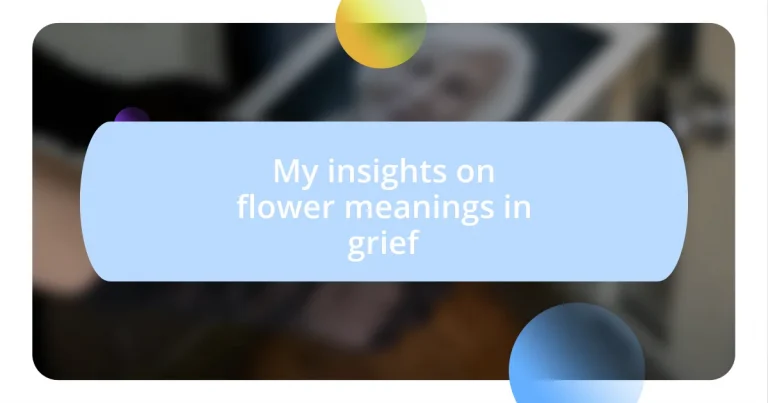Key takeaways:
- Flower symbolism, such as lilies representing purity and roses symbolizing love, plays a significant role in expressing grief and honoring lost loved ones.
- Choosing flowers that reflect the deceased’s preferences and personality can personalize funeral arrangements and evoke cherished memories.
- Caring for flowers during periods of grief can provide solace, connection, and a way to process emotions while celebrating the beauty of life.
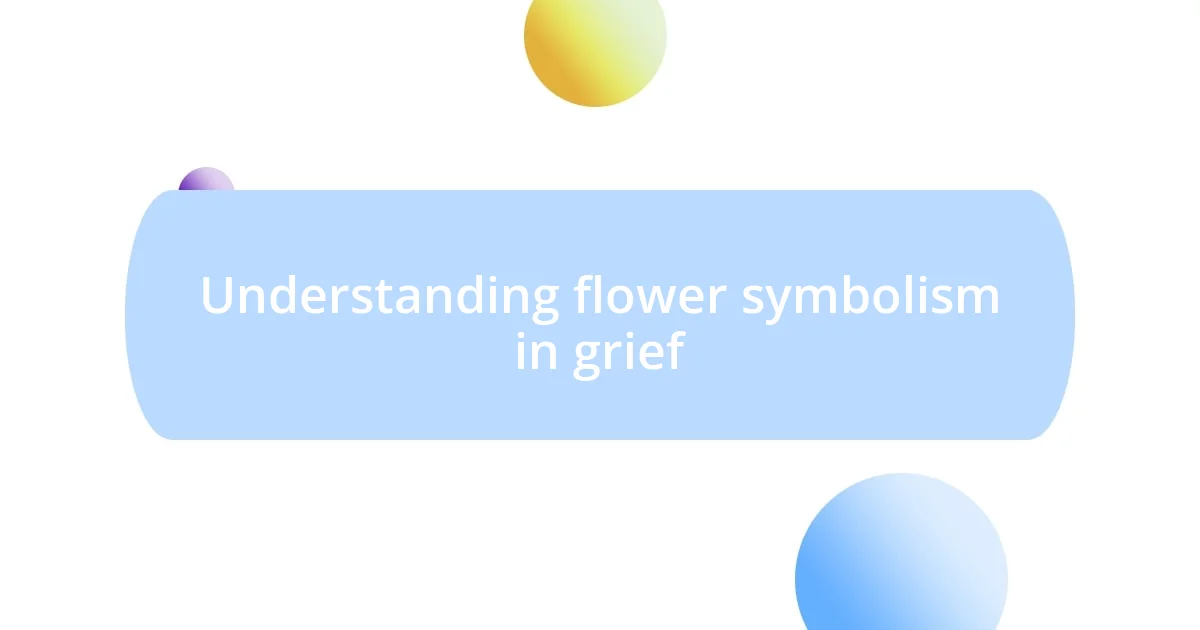
Understanding flower symbolism in grief
Flower symbolism in grief is a deep and often overlooked aspect of our emotional landscape. I remember when a dear friend lost her mother; the sight of lilies at the memorial struck me. They symbolize restored innocence and purity, reflecting the beauty of the person lost while offering a moment of solace to the grieving family. Have you ever noticed how certain flowers resonate during difficult times?
Roses, on the other hand, convey love and remembrance, which feels profoundly appropriate when we honor those we’ve lost. When my grandmother passed away, her favorite roses adorned the service. It was a bittersweet moment; the flowers encapsulated her spirit and the love we all shared. In what ways do flowers evoke memories for you?
Then there are chrysanthemums, which carry a different weight entirely depending on the culture. In many Asian cultures, these blooms are seen exclusively in funerals, symbolizing death and mourning. It intrigued me how a single flower can speak different languages of grief depending on where we are in the world. Don’t you find it fascinating how something as simple as a flower can carry a universe of meaning?
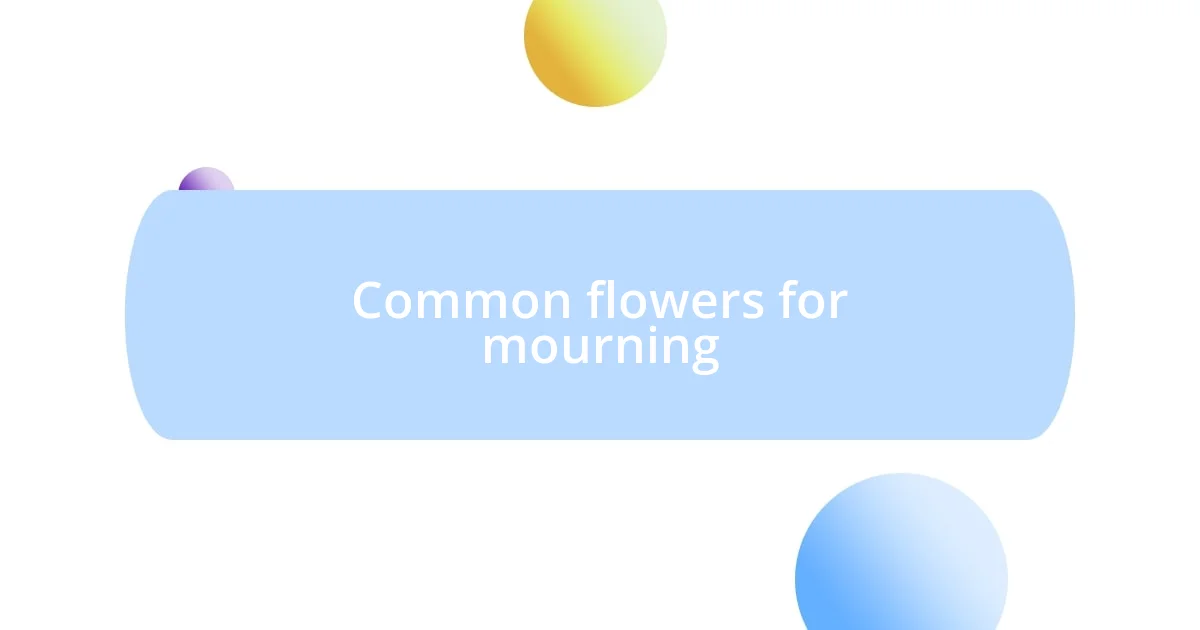
Common flowers for mourning
Common flowers for mourning come with layers of meaning, each offering a unique way to express grief. One flower that often comes to mind is the white lily. I recall attending a memorial service where white lilies were prominently displayed. Their ethereal beauty and symbolism of renewal and purity brought a serene atmosphere, giving attendees a moment to reflect on the life that had been lived. In my experience, they serve as a gentle reminder that even in our deepest sorrow, there can be a sense of peace.
Another common choice is the carnation, which symbolizes a love that never fades. It’s striking how something so simple can convey such depth. I remember receiving a bouquet of pink carnations at my friend’s father’s wake. They not only bridged the gap between the living and the departed but also reminded us of the enduring love shared among family and friends. It made me think about how these flowers can help us articulate feelings that words often struggle to express.
Lastly, I can’t overlook the powerful symbolism of the forget-me-not. These delicate flowers were once gifted to me during a poignant farewell. They symbolize remembrance and true love, and they encapsulate the memory of those we’ve lost in a way that feels incredibly intimate. It’s as if their very essence whispers reminders of the bonds we’ve formed, encouraging us to carry those memories forward. How do you feel when you see a flower that brings back a cherished memory?
| Flower | Symbolism |
|---|---|
| White Lily | Renewal and purity |
| Carnation | Everlasting love |
| Forget-me-not | Remembrance and true love |
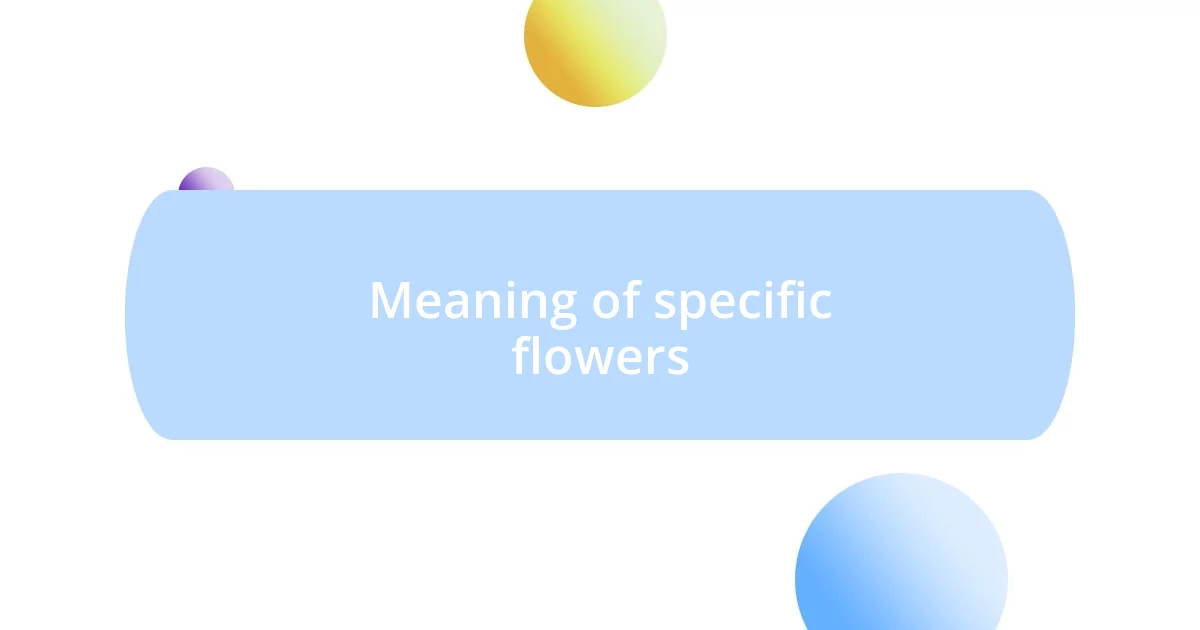
Meaning of specific flowers
The meanings associated with specific flowers can offer a profound layer of understanding during difficult times. I remember a particularly touching moment when hydrangeas were brought to a friend’s memorial service. Their soft hues and symbolism of heartfelt emotion resonated deeply; it was almost as if the flowers were translating the unspeakable pain we were all feeling. I found solace in their presence, as they seemed to cradle our grief while celebrating the love and connections we shared.
- Hydrangea: Symbolizes heartfelt emotions and deep gratitude.
- Orchid: Represents beauty, love, and strength—fitting for someone who lived life passionately.
- Daffodil: Signifies new beginnings and rebirth, a gentle reminder of hope in the midst of sorrow.
Navigating through the world of flower symbolism can feel like unveiling hidden layers of meaning that speak directly to our hearts. I remember walking through a garden where daffodils bloomed riotously; I was struck by their vibrant yellows. It reminded me of a dear friend who had an infectious spirit. The daffodils felt like an optimistic exclamation point in the story of her life, proving that beauty can indeed emerge from grief. It makes me wonder how flowers reflect our journey and the emotions we carry with us.
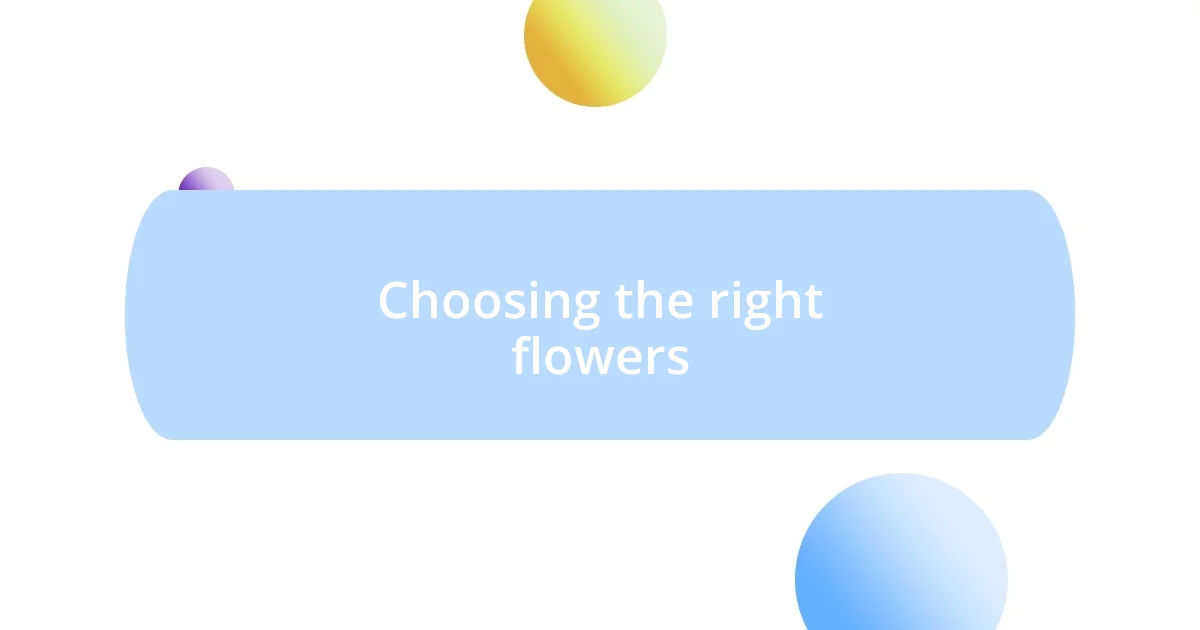
Choosing the right flowers
Choosing the right flowers can transform a somber occasion into a profound expression of love and remembrance. When I had to select flowers for my grandmother’s memorial, I found myself drawn to roses, symbolizing both love and respect. I recall placing a bouquet of soft pink roses by her picture, which reminded me of the countless times she nurtured me. Have you ever noticed how certain flowers can evoke cherished memories, like a familiar song bringing back a moment in time?
Another important factor in choosing flowers is considering the preferences of the deceased. While crafting a tribute for a close friend, I instinctively turned to sunflowers, a flower he adored. Their vibrant yellow hues spoke volumes about his warm spirit. Reflecting on this experience, I realize that selecting flowers meaningful to the person can truly personalize the farewell. What flower would you choose to honor someone you’ve lost?
Sometimes, it’s about the overall aesthetic and the message you wish to convey. I once attended a service where a stunning arrangement of violets was central to the display. I learned later that violets symbolize humility and faithfulness, which perfectly captured the essence of the person we were honoring. This experience taught me that each flower carries its own story, inviting us to share that narrative in our choices. How does the symbolism of a flower resonate with your own memories of loved ones?

Arrangement ideas for funerals
One idea for funeral arrangements is to create a personalized tribute by considering the deceased’s favorite flowers. I remember arranging white lilies for a dear friend’s service, as they had always been her favorite. Their elegant and calming presence brought an unexpected comfort to the gathering, and it felt like a gentle embrace during a heavy moment. What flowers have you encountered that seemed to speak directly to the soul of a loved one?
Incorporating elements that reflect the personality of the deceased can also enhance the arrangement. For instance, at another service I attended, a family chose a vibrant mix of colors featuring daisies and pansies, which perfectly matched the whimsical spirit of the individual. Seeing those flowers brightening the room made me appreciate how creatively expressing grief doesn’t just honor the loss; it also celebrates the life lived.
Furthermore, consider adding unique touches such as handwritten notes or small tokens within the floral displays. I once placed a cherished photo along with the roses at a memorial service, creating a visual connection for everyone who attended. It reminded us that beyond the flowers lay memories and stories begging to be shared. How do you envision the flowers at a funeral creating a sense of community and memory?
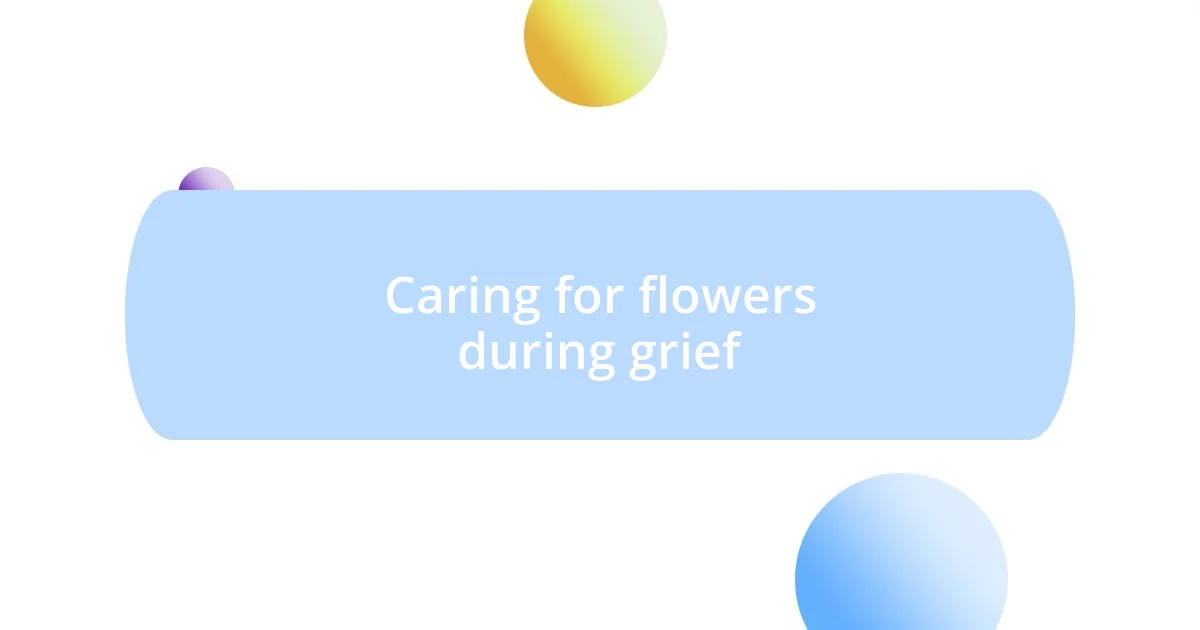
Caring for flowers during grief
Caring for flowers during grief is a tender act that can bring solace amid sorrow. I vividly recall a time when I nurtured a small garden dedicated to a close friend I lost. Every morning, tending to the plants felt like a loving way to connect with their memory, and seeing the blooms flourish was a gentle reminder of the beauty in life, even through grief. Have you ever found comfort in caring for something that reminds you of a loved one?
It’s important to think about the flowers’ specific needs, just as we tend to our own emotional well-being. When I cared for those flowers, I learned the balance of giving enough water but not drowning them—much like finding the right support for myself during mourning. This process taught me patience and resilience, reinforcing the idea that nurturing these floral tributes can offer healing in unexpected ways. How might taking care of flowers help you to process your grief?
Additionally, consider the space where the flowers will be displayed. I’ve observed how arranging blooms in a favorite vase or placing them in a spot that holds special memories can amplify their significance. I remember using an old pitcher from my grandmother’s kitchen that still smelled faintly of her lavender, which deepened my connection to the flowers I was caring for. In what ways do you think the environment can influence your relationship with flowers during difficult times?












